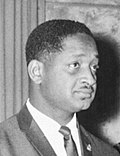| Member | Party | Notes |
|---|
| Cheddi Jagan | People's Progressive Party | |
| Brindley Benn | People's Progressive Party | |
| Ram Karran | People's Progressive Party | |
| Ranji Chandisingh | People's Progressive Party | |
| Henry Jocelyn Makepeace Hubbard | People's Progressive Party | |
| Charles Ramkissoon Jacob | People's Progressive Party | |
| Cedric Vernon Nunes | People's Progressive Party | |
| Fenton Harcourt Wilworth Ramsahoye | People's Progressive Party | |
| Eugene Martin Stoby | People's Progressive Party | |
| Earl Maxwell Gladstone Wilson | People's Progressive Party | |
| George Bowman | People's Progressive Party | |
| Sheik Mohamed Saffee | People's Progressive Party | |
| Ashton Chase | People's Progressive Party | |
| Moses Bhagwan | People's Progressive Party | |
| John Bernard Caldeira | People's Progressive Party | |
| Abdul Maccie Hamid | People's Progressive Party | |
| Derek Chunilall Jagan | People's Progressive Party | |
| Goberdhan Harry Lall | People's Progressive Party | |
| Yacoob Ally | People's Progressive Party | |
| Lloyd Linde | People's Progressive Party | |
| Joseph Rudolph Spenser Luck | People's Progressive Party | |
| Reepu Daman Persaud | People's Progressive Party | |
| Mohendernauth Poonai | People's Progressive Party | |
| Subhan Ali Ramjohn | People's Progressive Party | |
| Forbes Burnham | People's National Congress | Premier, Minister of Development & Planning |
| Ptolemy Reid | People's National Congress | Minister of Home Affairs |
| Neville James Bissember | People's National Congress | Minister of Health and Housing |
| Eugene Francis Correia | People's National Congress | Minister of Communications |
| Winifred Gaskin | People's National Congress | Minister of Education, Youth, Race Relations & Community Development |
| C.M. Llewellyn John | People's National Congress | Minister of Agriculture |
| Robert James Jordan | People's National Congress | Minister of Forests, Lands and Mines |
| Rudy Kendall | People's National Congress | Minister of Trade and Industry |
| Deoroop Mahraj | People's National Congress | Minister without Portfolio |
| Claude Alfonso Merriman | People's National Congress | Minister of Labour and Social Security |
| David Brandis deGroot | People's National Congress | |
| William Alexander Blair | People's National Congress | |
| Jagnarine Budhoo | People's National Congress | |
| Charles Frederick Chan-A-Sue | People's National Congress | |
| Oscar Eleazar Clarke | People's National Congress | |
| Royden George Basil Field-Ridley | People's National Congress | |
| John Gabriel Joaquin | People's National Congress | |
| Thomas Anson Sancho | People's National Congress | |
| Rupert Tello | The United Force | |
| James Henry Thomas | People's National Congress | |
| Alex Benjamin Trotman | People's National Congress | |
| Henry Milton Shakespeare Wharton | People's National Congress | |
| Aubrey Percival Alleyne | People's National Congress | Elected speaker and replaced by Philip Duncan |
| Peter d'Aguiar | The United Force | Minister of Finance |
| Mohamed Kasim | The United Force | Minister of Works and Hydraulics |
| Randolph Emanuel Cheeks | The United Force | Minister of Local Government |
| Stephen Campbell | The United Force | Ministry of Home Affairs |
| Cyril Victor Too Chung | The United Force | |
| Hari Prashad | The United Force | |


